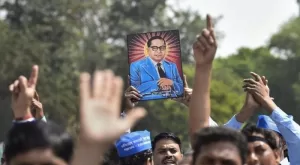“Abolish billionaires.”
That was the simple yet far-reaching message projected Saturday night onto the empty conference center in Davos, Switzerland where the World Economic Forum (WEF) usually meets during the annual summit of the world’s financial and governing elite.
Davos is a symbol of a failed era,” said Jenny Ricks, global convenor for the Fight Inequality Alliance, which—along with the local Swiss group Campax—organized the isolated protest in the midst of the global coronavirus pandemic.
While the traditional, lavish summit in Davos is being conducted largely online this year due to Covid-19 health restrictions, critics said the gathering of global elites is not where the world should look for just solutions.
The weekend action, said Ricks, “shows us where real change will come from—people on the frontlines of inequality, not the 1% who benefit from the current system. It is time to abolish billionaires.”
“The pandemic has laid bare and supercharged the systemic inequalities we are fighting more blatantly than ever,” she added. “We are facing the biggest single rise in inequality since the Great Depression while the 1% make massive profits and increase their wealth. We want a People’s Recovery Plan—a set of radically different responses from governments that work for people and the planet.”
The projection featured young activists from Kenya, the Philippines, Mexico, and the United Kingdom who lifted up the call for a “People’s Recovery Plan”—a set of demands, the organizers explained, designed “to combat the spiraling inequality experienced during the pandemic and achieve the systemic change that people on the frontlines of inequality are demanding.”
The weekend demonstration was part of the kickoff for the global #FightInequality campaign that will run through the end of January with coordinated actions in approximately 30 countries calling for a just and more equitable public health response and an economic program that gets to the root of pervasive injustice. Specifically, the groups behind the campaign and the “People’s Recovery Plan” are calling for:
- A People’s Vaccine that is available to all and not determined by what passport someone holds, and does not make huge profits for pharmaceutical companies;
- An end to austerity measures governments and international institutions force on economies;
- Universal public services, including health, water and education;
- Universal basic income and global social protection systems;
- Cancellation of all unpayable external debt for countries in need;
- Wealth taxes so the richest pay their fair share for the costs of the crisis, and an end to industrial levels of tax dodging;
- Recognition, redistribution and reward of the billions of hours of care work, unpaid and paid done by women, that keeps economies going;
- Climate justice and a just transition. The richest 10% cause more than 50% of consumption pollution. Governments need to make them pay for a just green new deal; and
- Jobs plans from our governments to ensure decent and dignified work for all.
“The pandemic has shown us that we do indeed need a new start,” said Armelle Ako, a campaigner at Campax. “If it was not clear before, it is now. But it is important that the new start does not follow old patterns. Environmental and social justice must be a foundation for our society. We need to get this message across clearly.”
The action over the weekend in Davos represents the growing international anger directed at the long-existing and grotesque economic inequality that has only been made more starkly evident by the Covid-19 pandemic—a dynamic captured in excruciating detail in a new report issued Monday by Oxfam International.
Titled “The Inequality Virus,” the new report reveals that while over two million people have thus far died from the virus—and hundreds of millions of people are being forced into poverty—the world’s very richest people and most powerful corporations are enjoying record profits and increased wealth. While the fortunes of the billionaires of the world have skyrocketed, returning to or even exceeding their pre-pandemic highs in just nine months, the study warns that economic recovery for the world’s poorest could take over a decade.
“We stand to witness the greatest rise in inequality since records began,” said Gabriela Bucher, executive director of Oxfam International, in a statement. “The deep divide between the rich and poor is proving as deadly as the virus.”
“Rigged economies are funneling wealth to a rich elite who are riding out the pandemic in luxury,” she added, “while those on the frontline of the pandemic—shop assistants, healthcare workers, and market vendors—are struggling to pay the bills and put food on the table.”
“The world’s ten richest men,” Oxfam noted, “have seen their combined wealth increase by half a trillion dollars since the pandemic began—more than enough to pay for a COVID-19 vaccine for everyone and to ensure no one is pushed into poverty by the pandemic.”
According to Oxfam:
Billionaires fortunes rebounded as stock markets recovered despite continued recession in the real economy. Their total wealth hit $11.95 trillion in December 2020, equivalent to G20 governments’ total Covid-19 recovery spending. The road to recovery will be much longer for people who were already struggling pre-Covid-19. When the virus struck over half of workers in poor countries were living in poverty, and three-quarters of workers globally had no access to social protections like sick pay or unemployment benefits.
“Extreme inequality is not inevitable, but a policy choice,” added Bucher. “Governments around the world must seize this opportunity to build more equal, more inclusive economies that end poverty and protect the planet.”
In a blog post publish Monday answering key questions generated by their new report, the group addressed whether or not it supports the idea of abolishing billionaires.
“Oxfam believes billionaires are a sign of broken economic system and that extreme wealth should be ended,” it stated. “We believe the world would be a better place if there were a lot less billionaires and a lot more nurses.”
(Article courtesy: Common Dreams, a US non-profit news portal.)




